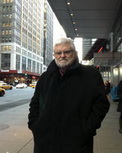 Chris
McDonnell, UK
Chris
McDonnell, UKchristymac733@gmail.com
 Chris
McDonnell, UK
Chris
McDonnell, UK
christymac733@gmail.com
Previous articles by Chris Comments welcome here
April
26, 2018
We belong, our belongings
Watching news images of refugees leaving home and country, I am struck by two closely associated aspects of their hard journey. First of all, they are leaving the small patch of land where they belong, not out of choice but through personal circumstances, the threat of famine or the deprivations of war. Wherever we move, the tap root of our lives is always rooted in the soil of our birth place. How often when we meet a stranger do we identify ourselves by our name and our place of nurture? Jesus was subject to the same identity test when those asking about his background discussed his roots. When Nazareth was mentioned, the retort came soon enough "Can anything good come out of Nazareth?" Philip's response to Nathaniel's comment was simple "Come and see". How often does part of a town or an estate get a bad name and those who live there carry the burden of the label?
Not only do the refugees lose their identity of locality, but they carry on their backs the few personal possessions they have managed to rescue, pitifully sparse and hurriedly gathered, their belongings. What they have left behind is abandoned to the weather and the passing stranger. Look round your own home. How hard would it be to make a selection of what to take if you were given half an hour to leave?
Our lives are patterns of over-lapping 'belongings', our identities shaped by so many groups, both small and large. Our smallest grouping, that of family, is precious and personal in many ways. It was once said that a definition of family is that small group where you can have disagreements yet still rebuild relationships and carry on. That is why when family disagreements do persist, the pain is greater.
This 'sense of belonging' is a common human experience, a need that is akin to our dependence on food and shelter. Belonging is the essential structure that gives meaning to life, helping to explain the day to day roller coaster of living. There is a common belief that we have many acquaintances, but few friends. Friendship, that personal relationship to the small group of people, with whom we have developed a closeness and trust, is hard won over many years and shared experiences. That is a reality we have earned. Those we meet in a broader context of email and the web, gain our trust and we theirs, through an exchange of ideas and opinions expressed through the written word, a different context for the growth of friendship.
That feeling of belonging, of being identified with a particular group is in marked contrast with the loneliness of being excluded, of being left out for one reason or another. The current discussion of Eucharistic sharing that is high profile in the Church in Germany is one instance within the Church where exclusion has given rise to so much hurt. A sacrament that is a central expression of the love of Christ for his people is set to become a pivotal point of pain and dissension. We should not seek to reinforce our own security at the expense of others.
A sense of belonging does not come about by chance, it takes time and effort to nurture the connections. During such time together we come to share many experiences, some of great joy and happiness, others of pain and sadness. Above all we need to listen to each other, for if the story is one way, we never really belong.
The on-going battle for legal status of the Dreamers in the US and the attempt to send home undocumented children is now being mirrored in recent days in our own country. The children of those who arrived in the UK on the 'Empire Windrush' from the Caribbean in 1948 and in subsequent years, now find they have sparsely documented information to justify their residency. What did exist we now know has been shredded by the Home Office and the data lost.
Writing recently Francis reminded us that "You shall not wrong a stranger or oppress him, for you yourselves were strangers in the land of Egypt. When a stranger resides with you in your land, you shall not oppress him. The stranger who resides with you shall be to you as the citizen among you; and you shall love him as yourself; for you were strangers in the land of Egypt." It took a Guardian article and an impassioned speech by David Lammy MP in the House to shake Government out of their complacency. And once again we have to thank Francis for his opportune leadership, reminding us of the reality of our belonging, one to another and each of us to the care of the Lord.
END
====